Our Sacred Honor (A Luke Stone Thriller—Book 6) Read online
Page 10
A tiny wick extended from the device. A small flame would ignite the Mother of Satan. The Mother of Satan would detonate, igniting the more powerful chemical, setting off the reaction that would make a very large explosion. These were the things that had been explained to her.
She pulled the box of wooden kitchen matches from her pocket. Her hands shook, and the first match went out instantly. She lit another. It stayed lit for a few seconds, not long enough for her to hold it to the wick.
She lit another.
She glanced around her. A woman was there, lying on the ground with her, perhaps five feet away. Her name was Faye. She was an older woman, in her fifties. She had gray hair and glasses, and was a little overweight. Her glasses were gone now, fallen off in all the commotion. But still she could see. Well enough, she could see.
“Helena?” she said. “What are you…”
Miryam looked away. She was not Helena. She had never been Helena.
To her right was a young police officer. He had tackled a full-bearded Orthodox man, and was struggling to handcuff him using a thin plastic zip tie. In the midst of his struggle, his eye caught hers. He looked at the flame. He looked at the plastic canister.
His eyes went wide. Circular eyes, large round eyes.
He forgot about the man he was trying to arrest. He crawled over the man, squirming like a snake, trying to reach her. The Orthodox man continued to fight, delaying the policeman, wasting one precious second.
“Wait!” the policeman shouted. “Stop!”
“I’m sorry,” Miryam said, and touched the flame to the wick.
Then the policeman was there with her. He easily pulled the canister away. She didn’t resist him at all. He held it up and gazed at it. The wick was already lit. He tried to squeeze it out with his thumb and forefinger, but the flame had gone into the canister.
It was inside. It was too late to stop whatever came.
She was surrounded by her enemies—hundreds of them, thousands of them. Many were the women who had been so kind, so beautiful—these devout women of God, these women who would fight for women.
She tried to think of Allah then, that he would accept her sacrifice, and find it pleasing. She looked and Faye was crawling to her.
“Helena, no!”
Miryam tried to think of Allah, but could not.
“Faye,” she said, shaking her head, the tears streaming now. “I’m so sorry.”
Then the light came, and the heat, and in that instant she thought:
It doesn’t hurt.
And in that same instant, before the darkness came, she also knew:
It’s the same God. It’s all the same God.
CHAPTER SIXTEEN
12:40 p.m. Israel Time (5:40 a.m. Eastern Standard Time)
Tel Aviv, Israel
Something terrible had happened.
Luke woke to shouts and screams somewhere nearby. His eyes popped open and he sat straight up in his hotel bed. The bed was large—king-sized—and he had fairly melted into it. Funny. Now that he was awake, there didn’t seem to be any sound at all.
Ed Newsam sat to his left in a chair, near the door to the balcony, calmly sipping from a white coffee cup. He was wearing shorts and a black T-shirt tight to his chest, and he seemed completely relaxed. His eyes watched as Luke adjusted to his surroundings.
The flat-panel TV directly across from the foot of the bed was on, the sound muted. It showed drone footage taken from above some kind of disaster—bodies and parts of bodies were strewn all over a plaza. The flagstones were dark red with blood. Flashing lights were everywhere. People ran back and forth with stretchers. Others simply writhed on the ground. As the drone circled overhead, Luke noted the Western Wall with the Temple Mount behind and above it, the Al-Aqsa Mosque complex with its golden dome coming into view.
The caption on the TV was in Hebrew. Just below it was the English translation:
Dozens feared dead in Western Wall suicide bombing.
“Oh no,” Luke said.
Ed nodded. “Yeah.”
“When did it happen?”
Ed glanced at his watch. “Maybe fifteen minutes ago.”
“Was there screaming?”
“Here in the hotel? Oh, yeah. Screaming, wailing, gnashing of teeth—the whole nine yards. I thought it would wake you, but it didn’t. You were out cold.”
“I heard it in my sleep. What are they going to do?”
Ed shrugged. “Them? Same old. Settlers in the West Bank have already started the reprisal attacks. It is what it is, man. You got all these people over here, he said, she said, acting like a bunch of unruly kids. I don’t think we have a dog in that fight. I’m here to do a job, which is to find Iranian nukes and put them out of business.”
“Why are you in my room?”
Ed smiled. “The TV is better in here.”
Luke stared at him and rubbed his eyes.
“Nah. Not really. I was going to wake you up soon. We just got the word a little while ago. We’re taking off from an airbase in the Negev Desert. We’re supposed to meet the mysterious Mr. Wonderful down there. We’ll fly over the Gulf of Aqaba, across Saudi airspace to Iraq, then land outside Basra. That’s where we’ll take off from for the jump. The long and the short of it is, we’re on the move soon, and we need to get on the same page with Trudy and Swann before we go.”
“Have you given any more thought to that kid?” Luke said.
“You mean our guide? The ghost?”
“Yes.”
“Yeah, I have. I’ve never met an honest to God covert operator with such a big mouth. Personally, I don’t think he’s the hot shot they say he is. Oh, I’m sure he’s tough enough in a gunfight, but that’s not what we need. I think they gave him to us because he’s expendable.”
Luke nodded. “Which in turn makes us…”
Ed took a sip of his coffee. “Expendable, yes.”
“That’s not too good,” Luke said.
“Well, I could be wrong about him,” Ed said. “I was wrong about something once before. But I’ll tell you this. When I see him again, I’m going to find out who he is, even if I have to give him a talking to.”
Luke smiled. “Especially if you have to give him a talking to.”
Ed shook his head, but seemed to suppress a smile. “I ain’t on a suicide mission, brother. If this guy’s a throwaway, we need to know that going in.”
“And if he is?”
Ed shrugged. “You’re the boss. You tell me. You want to die because the Israelis aren’t invested in this, they think this is an American thing, and so they gave us a cocky kid with one foot already in the grave?”
“I don’t want to die for any reason, brother,” Luke said.
Ed pointed at him. “Now that’s my kind of leadership.”
The door to the room opened and Trudy came walking in, followed by Swann. “I thought you were going to get him up,” Trudy said.
“I did get him up.”
“I meant all the way up, as in standing on his feet.”
“Well, if you want something like that, you need to specify.”
Trudy looked at Luke. She seemed fine—awake, energetic, refreshed. Her eyes squinted in concern. “You look like hell,” she said.
“I’m tired,” Luke said. What he almost said was “I’m old.” Too old for a suicide mission? Yes. Almost certainly.
There was no age young enough for a mission like that.
CHAPTER SEVENTEEN
1:10 p.m. Israel Time (5:10 a.m. Eastern Standard Time)
Beit Aghion – the Prime Minister’s Residence
Rehavia, Jerusalem
His confidence was shattered.
For the first time he could remember, perhaps for the first time in his life, he did not know what to do next. He spoke into the telephone, perhaps too harshly, to a young aide. The Americans were trying to schedule another call with their President Hopkins, and the aide had probably drawn the shortest straw—the one to ask Yonatan S
tern when would be a good time to speak with the President of the United States, the so-called leader of the free world.
“No,” he said into the handset. “I will not talk to her until this crisis is over. And you tell them this for me, please. I want you to speak it word for word. Are you ready?”
The young voice murmured its assent.
“You tell them, the Americans always lecture me about the narrow road to peace. How can there be peace? How can there be peace when these terrorist monsters train children to blow themselves apart, killing countless innocents who have gathered to pray for this very same peace of which they speak? How can there be peace when nowhere is safe, and nothing is sacred? What peace is this they are trying to obtain for us? Is it something we should want? Is it something we should wait for, this peace that never comes?”
There was silence on the other end of the line.
“Okay? Did you get that?”
“Yes.”
“Good. Tell them all of it. I want her to hear it all.”
He placed the phone in its cradle. He sat back in the chair and took a deep breath. This was his study, a beautiful, comfortable room. Weak winter light came in through the windows—it was bleak and overcast today, fitting weather for a day such as this one. The rug beneath his feet was decades old and Persian—a gift from Israel’s one-time ally, the Shah of Iran. Flames crackled in the fireplace. The walls were lined with bookcases, the shelves groaning under hundreds of books—few knew that the Israeli bogeyman was a voracious reader.
The classics of the ancient world—not just the Torah, but also Aristotle, Plato, and Homer, the Greek myths, the Epic of Gilgamesh, the Bhagavad Gita. He knew the Hindu gods, not as well as he knew his own God, but certainly as well as almost any outsider could. He knew the Gospels as well as any Christian. He had read the Quran cover to cover five times.
Confucius, the Tao Te Ching, The Art of War. He had worked his way through Shakespeare, but also James Joyce. The Enlightenment philosophers. Kahlil Gibran? Naturally. Who could live in this region and not read Gibran? He had read at least a hundred biographies and memoirs of great men and women, or people who had lived through extraordinary circumstances. Another hundred on military strategy.
The Devil Wears Prada? God forgive him, but yes. Harry Potter. The Lord of the Rings, of course. Isaac Asimov. Noam Chomsky and Howard Zinn. Karl Marx and Adam Smith and Charles Darwin. Paul Krugman. Sigmund Freud. Carl Jung.
He shook his head. He was the man who knew too much. He had read everything, and he knew everything—everything except how to make this stop.
He was clever, he supposed. Clever, but not smart. A tactician but not a strategist. He could outwit his political opponents, outflank the ones who would attack him from his right, while marginalizing the ones who criticized him from the left.
He could secure another trade deal, or a new weapons system. He could use Israeli technological goodies to bribe Jordan, Saudi Arabia, and Egypt into uneasy friendships, if you could even call them that. All the while, Hezbollah grew in strength, the Iranians acquired nuclear weapons, the Russians helped Assad re-impose his will in Syria, and the Palestinians became ever more restive, ever angrier, ever more radical. The Egyptian government had feet of clay, and could topple at any time—the Muslim Brotherhood waited and watched in the shadows, with knives out. The Turks gave aid and comfort to ISIS, and slipped weapons into Gaza on speedboats under cover of darkness.
Everywhere, they encircled him, the noose tightening.
At amusement parks, in the video arcades, they had a game where the player held a soft, fuzzy hammer. He was confronted by a wide surface full of round holes and every second or two, a mole would pop up from a hole, then drop back down again. The object of the game was to whack the moles on the head as they appeared.
Yonatan Stern played this game endlessly, with human lives at stake. He whacked harder and harder, as more moles popped up everywhere he looked. He needed more and better hammers. He needed more and bigger hands with which to hold them. Stronger, faster arms. Better vision. He needed to string razor wire over the holes to keep the moles underground. He needed to sterilize the moles so they would stop proliferating.
He looked up. His wife was here. She stood near the door, watching him, the eyes behind her glasses sad and concerned. When had she entered? Had she always been here? Had she heard his phone call? He didn’t know.
He saw her the way a man of almost seventy sees the woman with whom he has spent half a century. He sees the young woman he lusted for and fell in love with. He sees the old woman slowing down and fading. He sees all the women in the middle. He sees all of it, and none of it, at once. Mostly he sees his beloved.
“Sarah,” he said. “If you had asked me this morning, I would have told you we were winning. Slowly but surely, we were gaining the upper hand.”
“What would you tell me now?”
“We are lost. Win or lose, we are lost.”
He closed his eyes for a moment and felt the tears streaming from them. God. He hadn’t cried in how long? He didn’t remember.
When he opened his eyes, she was there before him. He wrapped his arms around her waist and pressed his head to her stomach, like a small boy might do to his mother. She wrapped her arms around his head, the way a mother might do to a small boy who was in distress.
“The Wall,” he said. “Oh my God. It will never be the same. It will never be a safe place again. It will never be sacred again.”
Instantly, she corrected him. “It will always be sacred.”
He did not respond, realizing the truth in what she said.
“What will the Americans do?” she said.
He shook his head. “Nothing. We are alone, once again.”
“They didn’t offer anything?”
“They sent us two commandos and an intelligence team. The commandos will slip into Iran, work their way across the country, and find the nuclear silos. They will assess their vulnerabilities and readiness, and then call in air strikes to destroy the weapons.”
“That’s something, isn’t it?”
He shook his head. “It will never work. The men will be killed. Or they will be captured and languish as hostages in some hellhole Iranian prison. Or, if they are lucky and very, very good at what they do, they will somehow escape from the country with their lives, but without ever finding the weapons.”
“Then why do they go, if those are their only options?”
He shrugged. “Elite commandos are a different breed. They are crazy, in a sense. They live for excitement. They need adrenaline like normal people need oxygen.”
“Was that why you once went on these missions? Because you craved excitement?”
For a few seconds, he caught the image of an airport lounge, old and outdated even for the times. He moved through it, as though watching the scene unfold on black-and-white 8-millimeter film. He was running, his men beside him, shooting down hapless Ugandan soldiers in uniform. A small bomb went off. Smoke poured from somewhere. People were screaming, somewhere up ahead. There was no time to waste.
He shook his head. “No. I never craved excitement. I was terrified the entire time, but pretended I wasn’t. I did it for Israel, because it was my duty, and because God called me to do so. I did it to protect people who could not protect themselves, who could not do the things that I could.”
“Then why,” she said, “do you assume these men do it for a different reason?”
He looked up at her. He thought of the men who had come here—who were they? Why had they come? Who and what did they leave behind? He had thought so little of this mission, of its chances of success, and he’d had so many other pressing issues to deal with that he hadn’t even bothered to meet them when they arrived.
“Because I’m an old man and a fool,” he said. “That’s why.”
“What do you think now?” she said.
“I think that you should run the country.”
“Darling,” she said
. “Don’t you know? I already do.”
CHAPTER EIGHTEEN
2:15 p.m. Israel Time (7:15 a.m. Eastern Standard Time)
Masada Air Base
Negev Desert, Israel
“Amazing,” Luke said.
The desert was like the surface of the moon.
He gazed out at it from the tarmac of the airstrip runway. The bleak land went on as far as the eye could see—mostly pale shades of yellow, red, and orange, undulating hillsides, craggy promontories, high plateaus, all of it seemingly lifeless, except for some scrub brush that dotted the ground and clung to vertical cliff faces.
With nothing to stop it, the wind howled across the vast landscape. It blew fine sandy grit into Luke’s face—his aviator sunglasses blocked it from getting in his eyes. A black bandana covered his nose and mouth.
“It’s nice to look at,” Ed said. “But I’ll take the sand at Miami Beach over this anytime.”
Luke smiled and shook his head. He glanced at Ed, who was sitting on their gear. The gear was piled near the cargo door of the plane, a small, fast unmarked four- or maybe six-passenger jet, which was probably meant to look like the private plane of some up-and-coming corporate oil titan.
Luke and Ed hadn’t loaded up yet for a very specific reason. They were waiting for the man called Ari Meil.
Across the runway and the aircraft taxiway, the control tower stood. Beneath it was a long, low-slung series of corrugated steel huts. It wasn’t much of an air base, if that’s what it really was. As Luke watched, a figure appeared over there, walking toward them. He was tall and upright, with a bag slung over one shoulder, and carrying another one with his opposite hand. He walked fast, but at the same time, seemed in no particular hurry.
“Here he comes,” Ed said. “The man of the hour.”
As the kid approached, Ed slowly stood. Luke followed the big man’s movements out of the corner of his eye. Ed rolled his shoulders a few times. He did a few deep knee bends and loosened his hamstrings just a bit. He reached to the sky, getting up high on his tippy-toes. He put his right arm in the air, then behind his back, and pushed down on the elbow with his left hand. Then he switched arms.

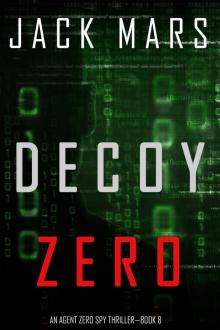 Decoy Zero
Decoy Zero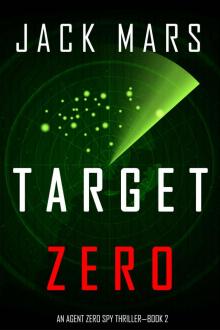 Target Zero
Target Zero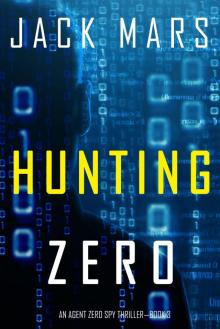 Hunting Zero
Hunting Zero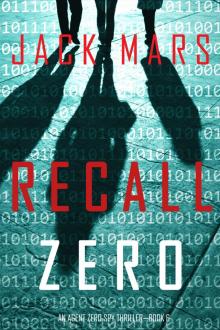 Recall Zero
Recall Zero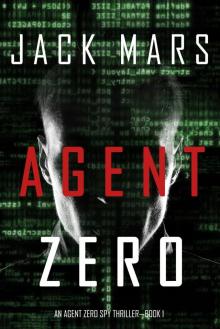 Agent Zero
Agent Zero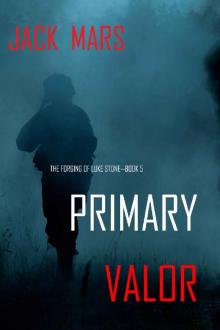 Primary Valor
Primary Valor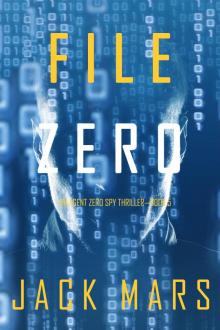 File Zero
File Zero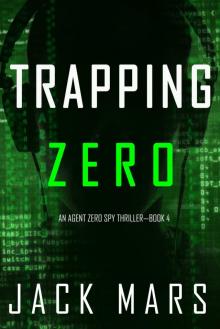 Trapping Zero
Trapping Zero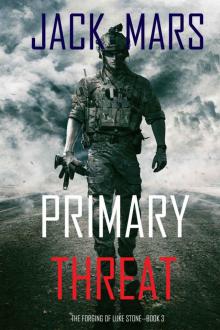 Primary Threat
Primary Threat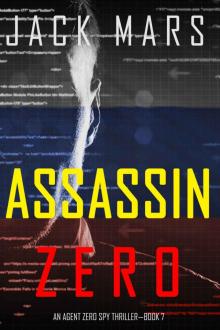 Assassin Zero
Assassin Zero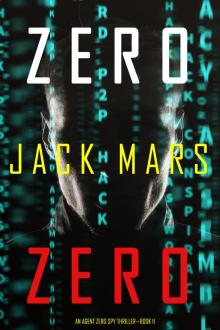 Zero Zero
Zero Zero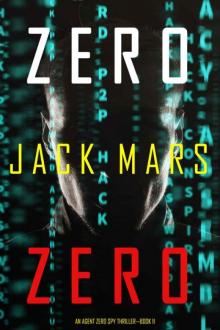 Zero Zero (An Agent Zero Spy Thriller—Book #11)
Zero Zero (An Agent Zero Spy Thriller—Book #11)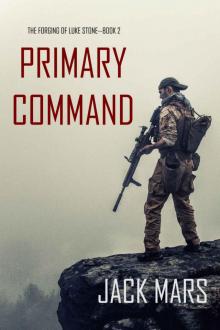 Primary Command
Primary Command![[Luke Stone 02.0] Oath of Office Read online](http://i1.bookreadfree.com/i/03/21/luke_stone_02_0_oath_of_office_preview.jpg) [Luke Stone 02.0] Oath of Office
[Luke Stone 02.0] Oath of Office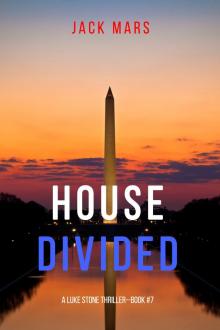 House Divided
House Divided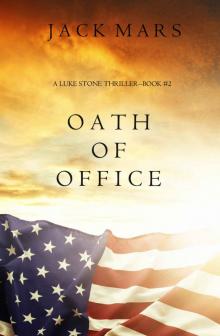 Oath of Office (a Luke Stone Thriller—Book #2)
Oath of Office (a Luke Stone Thriller—Book #2) Our Sacred Honor (A Luke Stone Thriller—Book 6)
Our Sacred Honor (A Luke Stone Thriller—Book 6)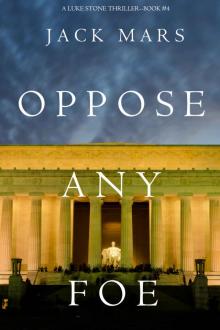 Luke Stone 04 - Oppose Any Foe
Luke Stone 04 - Oppose Any Foe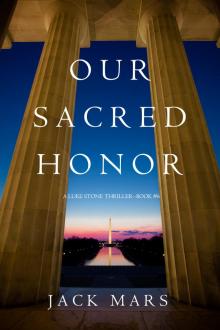 Our Sacred Honor
Our Sacred Honor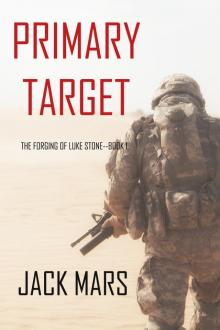 Primary Target
Primary Target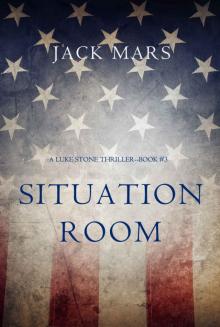 Luke Stone 03 - Situation Room
Luke Stone 03 - Situation Room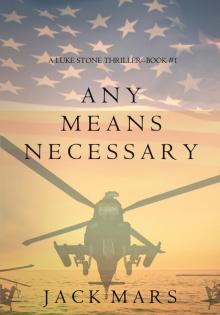 Any Means Necessary: A Luke Stone Thriller (Book 1)
Any Means Necessary: A Luke Stone Thriller (Book 1)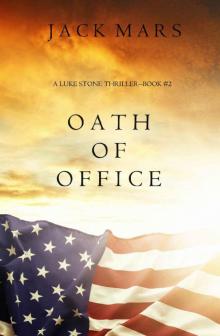 Oath of Office
Oath of Office